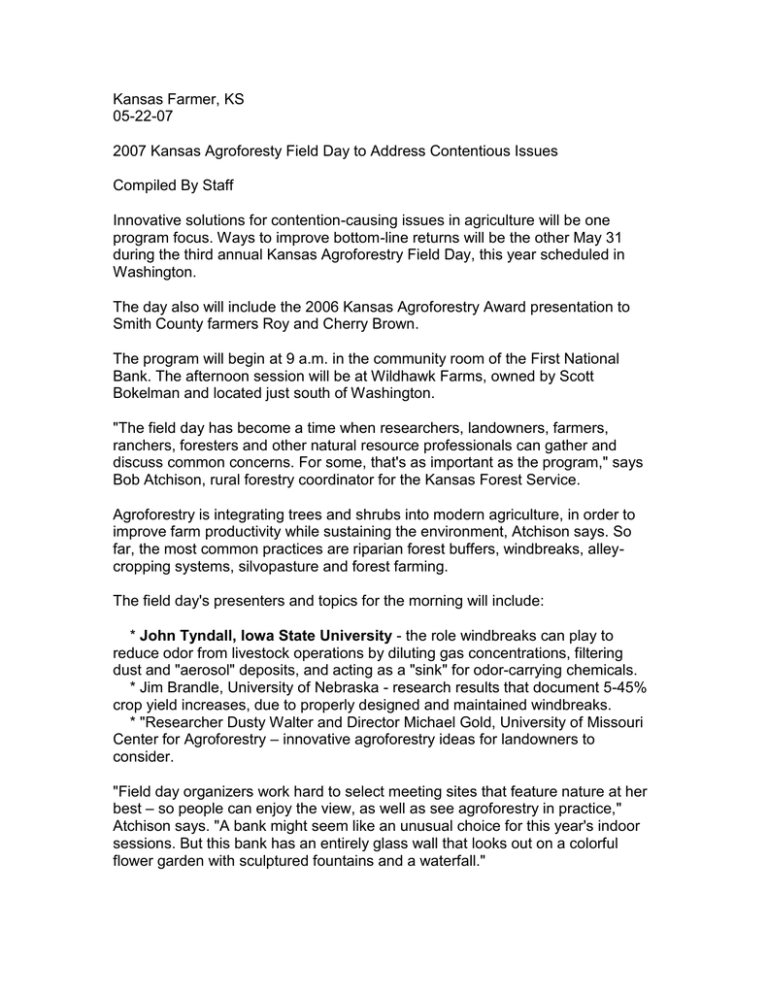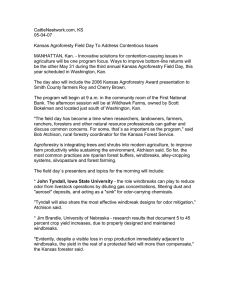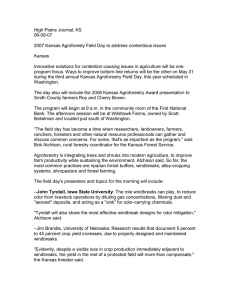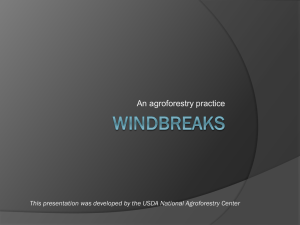Kansas Farmer, KS 05-22-07
advertisement

Kansas Farmer, KS 05-22-07 2007 Kansas Agroforesty Field Day to Address Contentious Issues Compiled By Staff Innovative solutions for contention-causing issues in agriculture will be one program focus. Ways to improve bottom-line returns will be the other May 31 during the third annual Kansas Agroforestry Field Day, this year scheduled in Washington. The day also will include the 2006 Kansas Agroforestry Award presentation to Smith County farmers Roy and Cherry Brown. The program will begin at 9 a.m. in the community room of the First National Bank. The afternoon session will be at Wildhawk Farms, owned by Scott Bokelman and located just south of Washington. "The field day has become a time when researchers, landowners, farmers, ranchers, foresters and other natural resource professionals can gather and discuss common concerns. For some, that's as important as the program," says Bob Atchison, rural forestry coordinator for the Kansas Forest Service. Agroforestry is integrating trees and shrubs into modern agriculture, in order to improve farm productivity while sustaining the environment, Atchison says. So far, the most common practices are riparian forest buffers, windbreaks, alleycropping systems, silvopasture and forest farming. The field day's presenters and topics for the morning will include: * John Tyndall, Iowa State University - the role windbreaks can play to reduce odor from livestock operations by diluting gas concentrations, filtering dust and "aerosol" deposits, and acting as a "sink" for odor-carrying chemicals. * Jim Brandle, University of Nebraska - research results that document 5-45% crop yield increases, due to properly designed and maintained windbreaks. * "Researcher Dusty Walter and Director Michael Gold, University of Missouri Center for Agroforestry – innovative agroforestry ideas for landowners to consider. "Field day organizers work hard to select meeting sites that feature nature at her best – so people can enjoy the view, as well as see agroforestry in practice," Atchison says. "A bank might seem like an unusual choice for this year's indoor sessions. But this bank has an entirely glass wall that looks out on a colorful flower garden with sculptured fountains and a waterfall." Field day participants' lunch will be provided there by Ricky's Café,of Hanover. The afternoon program will be at Wildhawk Farms, concluding by 3:30 p.m. It will feature four concurrent sessions that repeat, so participants can rotate through in smaller groups: a. Charles Barden, Kansas State University Research and Extension - research findings thus far from his Ash Creek study of riparian forest buffer design and tree shelters' benefits for buffer growth and protection from deer damage. b. Jim Strine, Kansas Forest Service, Northwest District - practical ways to renovate and improve the function of mature windbreaks (with an older Wildhawk Farms planting as an example). c. Clint Thornton, Kansas Department of Wildlife and Parks - managing native grass and enhancing wildlife habitat for specific species. d. Thad Rhodes, Kansas Forest Service, North Central District - proper design and maintenance of homestead windbreaks (illustrated by a young windbreak surrounding the Bokelman's home). Registration for the field day is $10. The event organizers request that those interested in attending register by May 25, to provide a head count for the lunch. Checks made out to the Kansas Forest Service can go to its headquarters at 2610 Claflin Road, Manhattan, KS 66502. More information about registering or the field day is available by calling Bob Atchison at 785-532-3310 (e-mail: atchison@ksu.edu).






